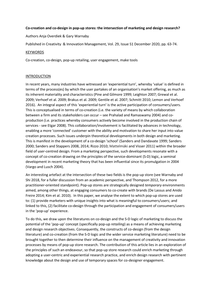Although it appears increasingly important yet potentially challenging to attract consumers to physical stores, location‐based messaging has been said to enable such attraction. Still, existing studies offer very limited insight into which particular location‐based persuasion approach retailers should use. This study aimed to establish and compare the potential of two discrepant persuasion strategies to influence consumers’ experiences and thereby stimulate them to visit the retailer's physical store. Drawing on persuasion theory and construal level theory, and using a vignette‐based online survey method, we determined that scarcity is a more effective persuasion strategy in the studied context than social proof; scarcity‐focused messages are experienced as more informative, more entertaining and less irritating, are therefore valued more, and are thus more likely to induce store visits. We discuss these findings and their implications for theory as well as for practice.
DOCUMENT

Co-creation as a concept and process has been prominent in both marketing and design research over the past ten years. Referring respectively to the active collaboration of firms with their stakeholders in value creation, or to the participation of design users in the design research process, there has arguably been little common discourse between these academic disciplines. This article seeks to redress this deficiency by connecting marketing and design research together—and particularly the concepts of co-creation and co-design—to advance theory and broaden the scope of applied research into the topic. It does this by elaborating the notion of the pop-up store as temporary place of consumer/user engagement, to build common ground for theory and experimentation in terms of allowing marketers insight into what is meaningful to consumers and in terms of facilitating co-design. The article describes two case studies, which outline how this can occur and concludes by proposing principles and an agenda for future marketing/design pop-up research. This is the peer reviewed version of the following article: Overdiek A. & Warnaby G. (2020), "Co-creation and co-design in pop-up stores: the intersection of marketing and design research?", Creativity & Innovation Management, Vol. 29, Issue S1, pp. 63-74, which has been published in final form at https://doi.org/10.1111/caim.12373. This article may be used for non-commercial purposes in accordance with Wiley Terms and Conditions for Use of Self-Archived Versions. LinkedIn: https://nl.linkedin.com/in/overdiek12345
MULTIFILE

Purpose: The purpose of this study is to assess the evolution of restaurant locations in the city of Hamilton over a 12-year period (1996 to 2008) using GIS techniques. Retail theories such as central place, spatial interaction and principle of minimum differentiation are applied to the restaurant setting. Design/methodology/approach: A database of restaurants was compiled using the NZ yellow pages and contained 981 entries that consisted mainly of location addresses and types of cuisine. This paper focuses on locational patterns only. Findings: A process of geo-coding and clustering enabled the identification of two clustering periods over 12 years for city restaurants, indicating locational patterns of agglomeration within a short walking distance of the CBD and spill over effects to the north of the city. Research limitations/implications: The data do not allow statistical analysis of the variables causing the clustering but offer a visual description of the evolution. Explanations are offered on the possible planning regimes, retail provision and population changes that may explain this evolution. Practical implications: The findings allow identification of land use patterns in Hamilton city and potential areas where new restaurants could be developed. Also, the usefulness of geo-coded data in identifying clustering effects is highlighted. Originality/value: Existing location studies relate mostly to site selection criteria in the retailing industry while few have considered the evolution of restaurant locations in a specific geographic area. This paper offers a case study of Hamilton city and highlights the usefulness of GIS techniques in understanding locational patterns.
LINK